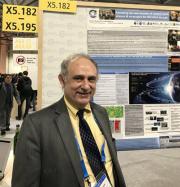- Home
- About
- Programs
- Carbon Science Planning
- Resources
- News & Opportunities
- Contact Us
News and Opportunities
2018
June, 2018
We are planning to convene sessions at the December 2018 American Geophysical Union (AGU) meeting in Washington, D.C. to engage with community members. The focus will be on two major accomplishments. We are celebrating the 20th anniversary of the Carbon Cycle Interagency Working Group (CCIWG) and the U.S. Carbon Cycle Science Program. We are also in the process of preparing for the final release of the 2nd State of the Carbon Cycle Report (SOCCR2) in the fall of 2018 (pending final U.S. Government clearance).
The Ocean Carbon and Biogeochemistry Program (OCB) is organizing their annual summer workshop in Woods Hole, Massachusetts June 25-28, 2018
For details, see the meeting website here.
You can follow the workshop on Twitter (#OCB2018). Webcast link here.
May, 2018
During the May 16-18, 2018 International Symposium on Carbon in Mexico convened in Instituto Tecnológico de Sonora (ITSON), the Co-chair of the Carbon Cycle Intergency Working Group Dr. Nancy Cavavallaro (National Program Leader at USDA NIFA) received the 2018 International Award for Scientific Research from the National Science and Technology Council of Mexico (Consejo Nacional de Ciencia y Tecnología, Mexico or CONACYT) and Programa Mexicano del Carbono (PMC) (translated as the Mexican Carbon Program).
April, 2018
A CCIWG poster entitled, ‘Assessing the last decade of carbon cycle science and strategy for the next decade’, by Gyami Shrestha, Nancy Cavallaro, Jim Butler, Zhiliang Zhu, Laura Lorenzoni, and the SOCCR-2 Team was presented at EGU 2018 in Vienna, Austria on April 10, 2018 by Dr. Jack Kaye (Associate Director for Research of the Earth Science Division within NASA’s Science Mission Directorate).

Over 45 members of the 2nd State of the Carbon Cycle Report (SOCCR2) Team met at USDA NIFA in Washington, D.C. from April 3 to 5, 2018.
During the period of 2.5 days, participants deliberated key remaining issues from the public and National Academy of Sciences SOCCR2 fourth-order draft review period and worked on revising the draft chapters collaboratively across chapters.
March, 2018
*Cross-posted from U.S. National Academy of Sciences (NAS) communications*
Two reports reviewing major climate assessment reports have been released today by the NAS Board on Atmospheric Sciences and Climate.
A website featuring a new network focused on U.S. urban carbon dioxide emissions was unveiled in early February 2018.
February, 2018
...in conjunction with the 2018 Ocean Sciences Meeting,... sessions on changing ocean chemistry and ecosystem response....

